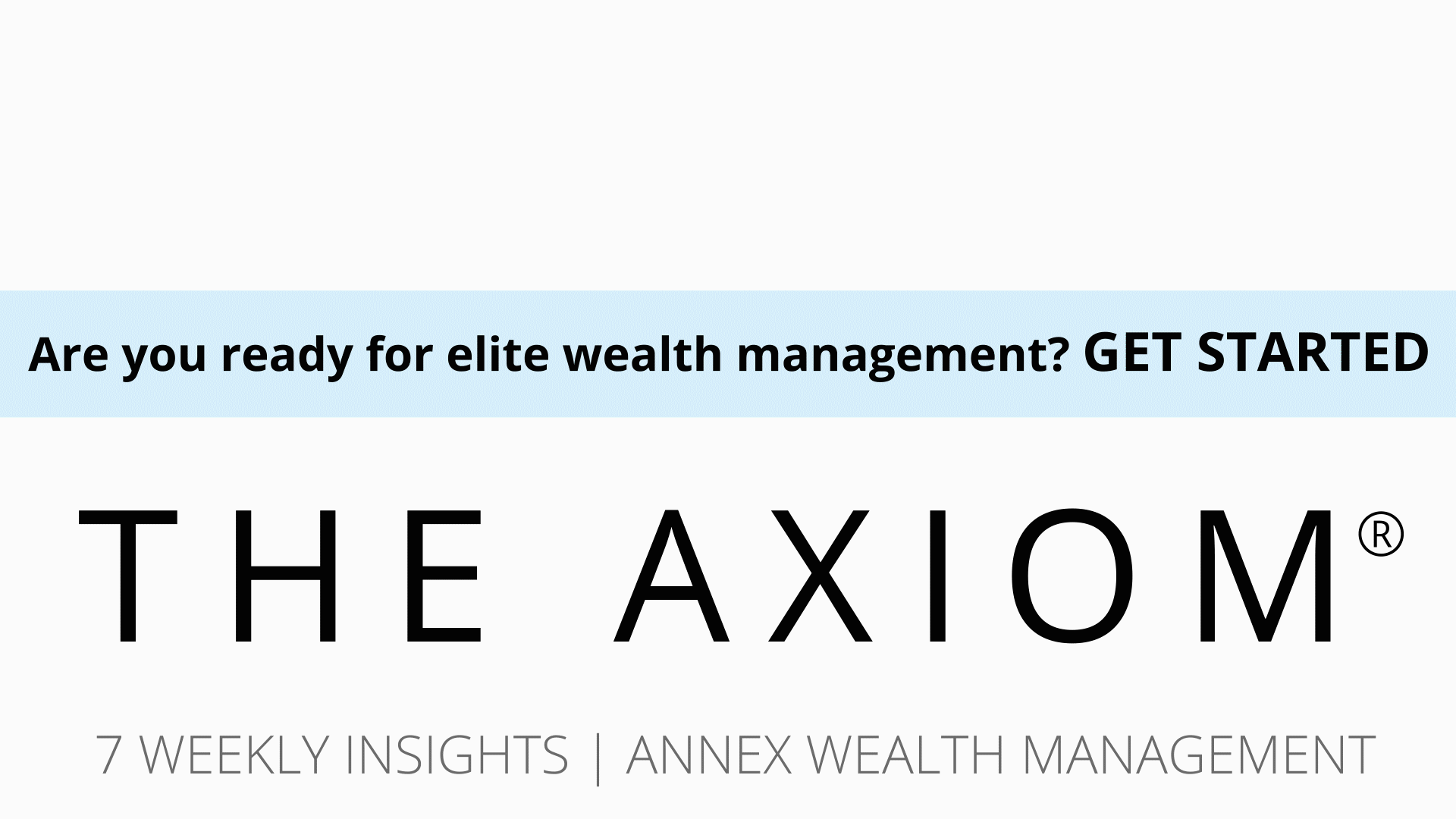
Axiom | Vol 258
As Economy Continues To Grow, Can The Fed Continue Quantitative Easing? | High Prices & Low Supply May Be Cooling Housing Boom

Meet The Axiom®’s Guest Editor: Patricia Tobin, CFP®
Hello! My name is Patty Tobin. I am one of the Wealth Managers at Annex.
We work with clients in an attempt to provide a sense of confidence (and relief!) that many aspects of planning are in order or being addressed. This includes financial planning and investments, estate planning, tax strategies and more. The team at Annex works in the best interest of our clients every day. It’s so rewarding!
I’m a proud graduate of UW-Madison and enjoy Badger football, biking and spending time at our family cottage.
BACK TO TOP ↑

As Economy Continues To Grow, Can The Fed Continue Quantitative Easing?
As earnings reports continue to demonstrate health and the housing market shows continued growth, how long will the Fed continue quantitative easing? Annex Wealth Management’s Dave Spano and Derek Felske discuss.
BACK TO TOP ↑

Poll Recap: How Smart Is Your Home?
Technological advancements have made life easier. Smart technology allows you to lock your doors, turn off lights, and play your favorite song through voice commands.
In our latest poll “How smart is your home?” we asked readers to select the devices they currently use: Smart Speaker, Smart Lightswitch, Alexa, Google Home, or Facebook Portal. All respondents had at least one of these smart devices in their home, and one poll-taker had all of the items listed – now that’s an Einstein home!
Not surprising, two clear favorites were the Alexa (47%) and Smart TV (41%).
58% of respondents said they use a Ring doorbell or some other form of security/video device. A recent report suggests the home security market is rising and could continue to trend upwards as consumers prioritize the safety of their homes and families.¹
29% of respondents said they use the Facebook Portal – a smart display device which allows video calling via Facebook Messenger or WhatsApp. The Portal boasts Alexa functionality and automatically pans and zooms to keep you in the frame. As cool as that seems, many consumers are wary of putting the device in their home after Facebook privacy concerns.²
Smart Speakers are mainstream at this point, with Amazon, Apple, Philips, Sonos, Google and more competing in the space. Only 11% of poll respondents said they currently use Google Home as their smart speaker option.
BACK TO TOP ↑

If You’re Looking To Find A More Tax-Friendly State, Consider These Key Factors
With the 2017 federal tax law in effect, there has been a lot of talk about the change in the SALT (state and local tax) deduction, a deduction we receive for state income taxes and property taxes paid.
SALT deductions continue to be limited to $10,000 per return in 2021, and are slated to remain capped through 2025, which means many people may not be getting the same tax benefit for state income taxes paid. Moving to a no- or low- income tax state during retirement may be more appealing. Nine states do not have an income tax:
- Alaska
- Florida
- Nevada
- New Hampshire
- South Dakota
- Tennessee
- Texas
- Washington
- Wyoming
Consider What It Takes To Leave
Before you make the switch to leave your home state, be aware of what the state uses to determine your legal residence for income tax purposes. The Wisconsin’s Legal Residence Questionnaire asks questions such as did you change your driver’s licenses, where you vote, where your car is insured, and what your future intents are. Wisconsin typically requests the form with your tax return in the year you change your residency.
Consider What It Takes To Establish Residency
Depending on what state you move to they may have their own requirement on what you need to file/do to establish residency. For instance, in Florida you’re able to file a Declaration of Domicile, affirmatively establishing your intent to be a Florida domiciliary going forward. Unfortunately, establishing domicile isn’t as easy as completing a form. Please see your advisor for a comprehensive list of action items for establishing domicile in your target state.
Consider If You’ll Be Paying Partial-Year State Taxes
If you’re deducting expenses on your federal tax return at tax time, keep in mind that you may have to file two separate state tax returns when you move out of state. If you earned income in two different states during the fiscal year — unless you’re moving to or from a state that does not collect individual income taxes, you’ll need to file a return in each state to cover the time you lived there.
Consider Changes To Insurance
If you’re changing jobs, consider your individual or new employer-sponsored insurance options, like life, health and disability insurance. Ask your private insurance provider about coverage for your cars, any items you have in storage, and your residence to make sure you’re covered during your move.
Talk with your financial advisor about any insurance policies you have to see if they still apply to your change in circumstances. Sometimes, more or less insurance is necessary when you move someplace new.
BACK TO TOP ↑

“The Ask Annex segment provides great questions from our readers with responses from our team of experts. There is always something to learn.”
– Guest Editor: Patricia Tobin, CFP® | Wealth Manager
________________________________________
This week’s Ask Annex comes from Dale, who asks:
“Do you think the RMD for IRA’s might be suspended again in 2021?”
___________________________
We asked Annex Wealth Management’s Eric Strom, CFP®:
As you know, the CARES Act of 2020 temporarily waived required minimum distributions (RMDs) from traditional IRAs, inherited IRAs and employer plans. An RMD is the amount of money that must be withdrawn each year from such accounts once you reach a certain age, typically in your 70’s.
So far, additional RMD relief in 2021 is not looking likely. There have been a variety of tax law changes proposed this year, and additional RMD relief has generally not been included in the proposals.
Some experts believe we could see additional RMD relief in 2021 if there was a severe market decline. Others believe a 2021 RMD waiver would be unlikely because the relief in 2020 was not targeted to those most in need. Bottom line: RMDs are back in 2021 and it’s important that you plan for them.
On a related note, we have seen proposed legislation in 2021 relating to the age that you begin taking RMDs in the first place. You may remember the SECURE Act, passed in late 2019, which increased the RMD start age from 70 ½ to 72. There is proposed legislation, called SECURE Act 2.0, which would phase in further increases to the RMD start age. The legislation would ultimately back up the start age of RMD’s to 75, although this would gradually phase in over a decade-long period. We’ll be watching this closely, so make sure to stay connected with Annex for further updates in this area.
–Eric Strom, CFP®
BACK TO TOP ↑

When it comes your investment and retirement plan, the value of an advisor is an important discussion. You need to know who you’re working with and what you’re getting out of that relationship. In this two part series, we take a deep dive into what it means to work with a financial advisor.
Does Your Advisor Add Value Beyond Investments?
BACK TO TOP ↑


“I love easy access to information – which is why I like The Axiom! As much as I try to catch them, I frequently miss some of the Annex radio segments. With one easy click, I’m up to date!”
– Guest Editor: Patricia Tobin, CFP® | Wealth Manager
________________________________________
KNOW THE DIFFERENCE MINUTE:
High Prices & Low Supply May Be Cooling Housing Boom
KNOW THE DIFFERENCE MINUTE:
Sephora/Kohl’s & Ulta Beauty/Target Partnerships
In Case You Missed It
What’s A 401(k) Loan? 401(k) Loan Definition
BACK TO TOP ↑

Annex Wealth Management provides free workshops, open to the public, on key wealth management topics.
Each week, we provide links to register for upcoming events.
BACK TO TOP ↑